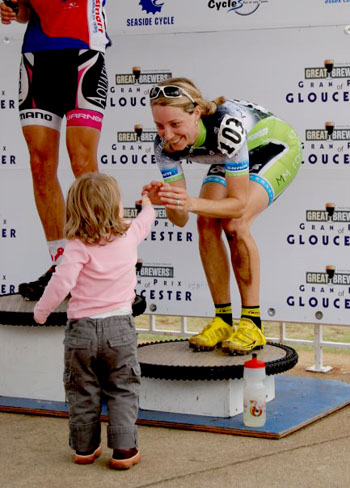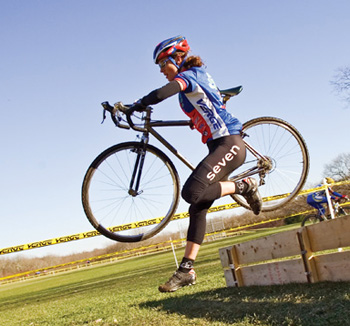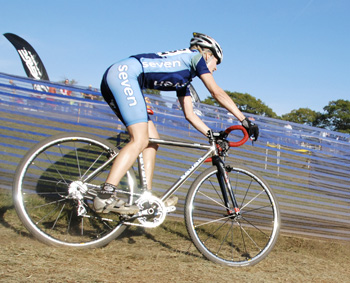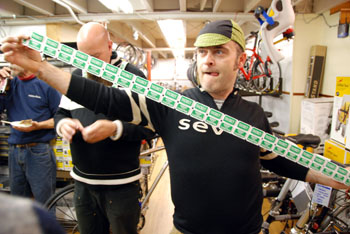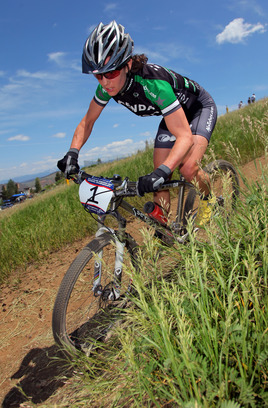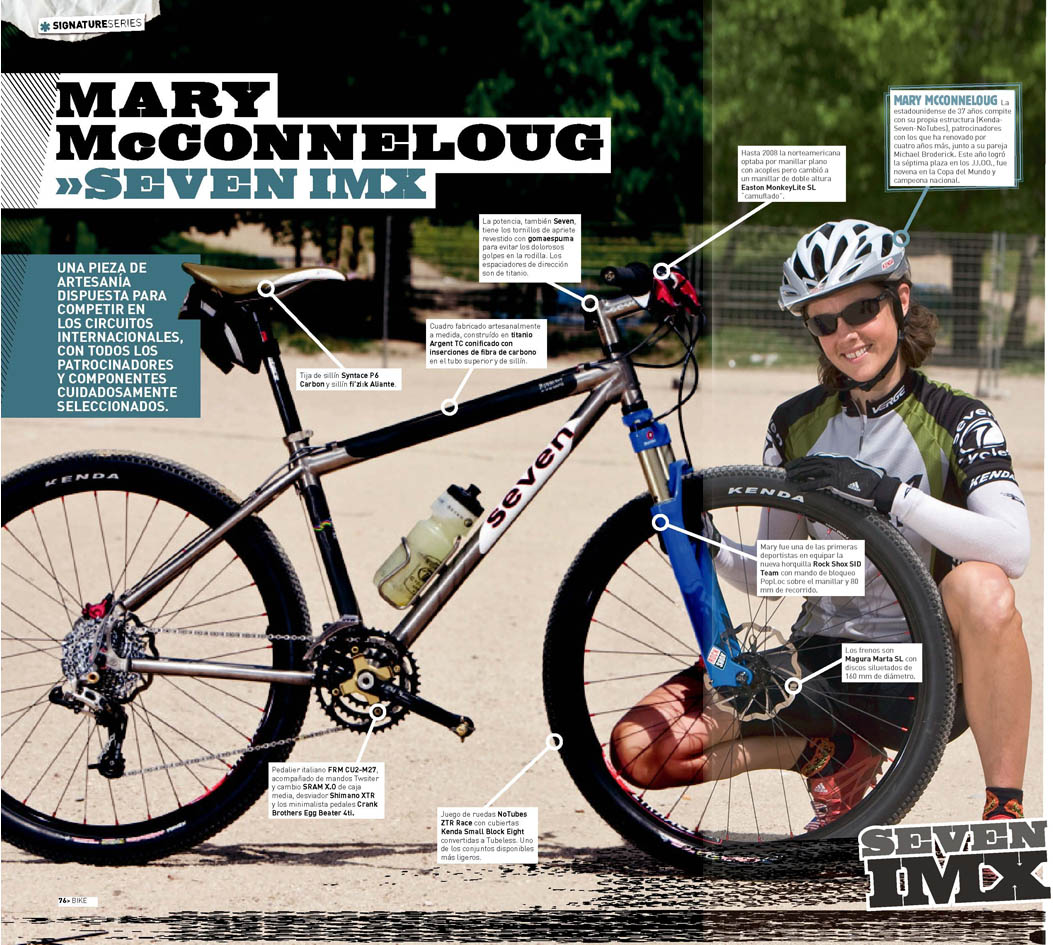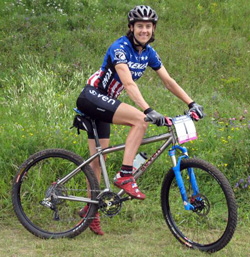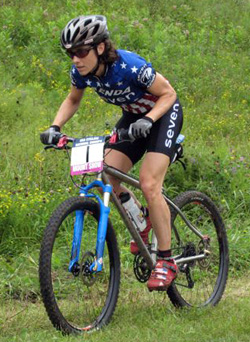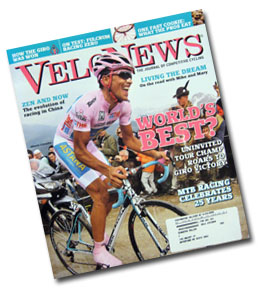
On the Road with Mike and Mary
by Fred Dreier
Illustrations by Brian Taylor
Think your last road trip was rough? McConneloug and Broderick have loads of stories about traveling woes. Here are just a few. In 2005 they were driving their 1996 Ford 350 van up Utah’s steep highway 143 to Brain Head when seals in the transmission exploded, spraying fluid onto the exhaust manifold and starting a fire. A passerby sprayed the flames out, and a friend towed their team trailer the rest of the way. It wasn’t the first time strangers bailed them out. Broderick says the couple has gotten stuck in the mud more times than they’d like to admit. “You just learn not to panic. Someone is usually around to help push us out,” he said. The locals aren’t always hospitable, however. In 2006 the two were camping in a field in New Zealand after the world championships when they heard something strike the side of their Mercedes camper van. Someone had shot at them, and the bullet passed through the wall of the camper, through their luggage and came to rest inside Broderick’s foam pillow, the same one he was sleeping on. They’ve also been sideswiped. More times than they’d like to remember. Living out of the RV in Europe sure has its downfalls, like when the duo dishes out $7.90 a gallon, and a 245-mile road trip costs roughly $130. And the van isn’t the best place to go to treat medical maladies, like in 2006 when McConneloug crashed into a barbed wire fence in Belgium. But the bigger the van the better, as the two regularly bring four huge bags stuffed with a season’s worth of gear and supplies to Europe. Of course, security measures make things tricky, and Broderick buries stashes of CO2 quick fills and chain lube in secret locations around the world.
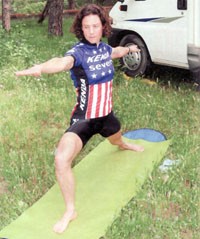
Mary McConneloug still giggles when recounting the fiery death of her Ford van on a lonesome mountain pass in southern Utah.
“Holy shit, it was wild, it was like the whole thing just blew up!” says McConneloug her saucer-white eyes bulging with excitement. “I guess the transmission caught fire. We almost didn’t make it to the race in Brian Head.”
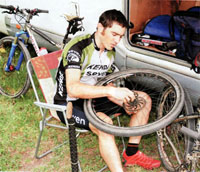
Mike Broderick, McConneloug ever-present Kenda-Seven teammate, mechanic and life partner, finishes his final downward dog of the day in the adjacent room. He chimes in his two cents over Bob Marley’s “Jammin’.”
“That was pretty crazy, Mary, but how about the time we found that bullet hole in the back of the RV in New Zealand?” he says. “It was super trippy.”
McConneloug pauses from chopping vegetables for the evening’s stir fry, recalling how the errant bullet came to rest inside Broderick’s pillow. She drops her jaw in a dramatic gasp—woah, that was super trippy. The theatrical expression is vintage McConneloug whose bubbly personality and untamed dark curls—not to mention her job as a professional mountain bike racer,—stand in defiance to the traditional role of a 37-year-old American woman. It’s the evening before the second round of the 2008 cross-country World Cup, and McConneloug and Broderick—the cosmic nomads of American mountain bike racing—are recounting the many funny, harrowing and downright strange tales from their decade-long life spent living on the road. McConneloug mentions her out-of- body race at the world championships in 2006—”I just wanted to go calm and Zen, like a ninja master through the woods,” was her famous post-race quote. Broderick waxes philosophically on what his life might hold had he never found mountain bike racing.
“I’d be a surf bum working to get by more than working for a career he says.
It’s been three years since the ill-fated Kenda-Seven team van smoldered on the side of a switchback-filled highway in the heart of the American Southwest. Outside the window of their cozy rented flat in Offenburg, Germany sits a shiny white RV, their home for the next six months. The mobile home doesn’t appear to be on the verge of combustion but after a summer spent driving across Europe who knows? Beyond that lay miles of sprawling vineyards on the edge of western Germany’s Black Forest brilliantly lit by the setting sun.
Since meeting in 1999, Broderick and McConneloug have lived in various homes on wheels spinning across the globe while pursuing their common passion for off-road bicycle racing. They have awoken on barren beaches in Chile, Hawaiian rainforests, Belgian cow pasture and cliffs—overlooking the Mediterranean. They are firmly committed to racing the world’s premier series, the UCI World Cup, and while they are professional cyclists, their trade is anything but a means to an end. Sponsorship dollars cover living and travel expenses, and that’s about it. The two compete without the luxuries of team managers masseuses, mechanics or handlers.
They could be on the cover of magazines if they’d have decided to race in the U.S., but that’s not what they want,” said Cindy Koziatek husband of the famed Stan’s tubeless sealant designer, and a longtime sponsor of the two. “They never seem to get the recognition they deserve but they do it because they love the lifestyle.”
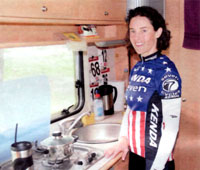
McConneloug and Broderick embody the self-subsistence heritage of mountain biking’s old-school roots, when most riders swilled beers and simply camped at the race venue. The two have everything they need right inside their motorized home, all the way down to their espresso machine and toaster.
And somewhere along their long (and sometime strange) trip, the former dirtbag bike hippies have matured into Olympic-caliber athletes. In addition to her three national cross-country titles, McConneloug already owns Olympic laurels—she grabbed the lone American spot in 2004, finishing 9th in Athens. This year both McConneloug and Broderick sit prominently on the United States long team to make the 2008 Games in Beijing.
But at the moment, Olympic glory can wait. McConneloug’s home-cooked meal is simmering on the stove, Broderick has some last minute wrenching to do on the race bikes and both need to attack a growing pile of laundry. The apartment—offered up a the last minute by the race director—affords the duo a rare night away from the camper.
“This isn’t how it usually goes, we’re usually not this comfortable,” says Broderick. “We’ve learned to flow with this life. We’re uninhibited by physical stuff. I mean, we have our bikes, our yoga mats and the RV and that’s about it. I think it’s how we’re at our best.”
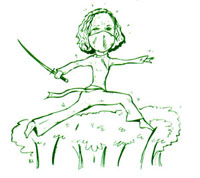
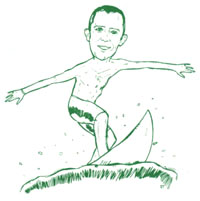
How Mike Met Mary
Mary McConneloug was covered in mud, drenched in sweat and probably didn’t smell all that fresh the first time Mike Broderick laid eyes on her. The two crossed paths at the finish line of the 1999 Oroville Classic cross-country race in Northern California, and Broderick admits the girl got his heart a fluttering.
“She was this, like, smiling, mud-covered creature from the woods and I was just in love,” Broderick says. “I saw her and pretty much told my friends, ‘There’s my girlfriend, that’s her.’”
From anyone else the story might hold a flicker of folklore or tall-tale flavor, but not from Broderick, 34, whose deadpan tone delivers the stamp of authority. A native of Martha’s Vinyard, Broderick’s Boston Brahman accent is long gone, replaced by the universally monotone dialect of the surf bum.
Broderick, in fact, was in California on a full-bore surf-bumming adventure when he met McConneloug. In those days he lived in Santa Cruz, and called his 1995 Toyota 4×4 pickup truck home, working part time mowing lawns and hauling ice for his family cooling company to pay his few bills. He pursued mountain bike racing on the weekends, when the waves were too crowded to ride.
By contrast, McConneloug lived with her parents in Fiarfax, California where she worked as a seamstress and waitress to make ends meet. A 1993 graduate of Santa Clara University in vocal performance, McConneloug had traded in opera singing for mountain bike racing in her late 20s, but soon discovered her hidden talents. By 1999 she was as anonymous newcomer mixing it up with the region’s best female racers.
“I just wanted to go calm and Zen, like a ninja master through the woods.—Mary McConneloug, after the world championships in 2006
“Two weeks [after meeting], Mary moved into my truck with me, and it was like, “Bam! We were a team,” Broderick remembers. “She was taking care of me, making me meals, and I was looking after her bike. We were in love, but it was all about the racing. After I met Mary, I knew it was time to just push the pedals.”
Their relationship set, Broderick and McConneloug honed their collective focus entirely on racing. They crisscrossed the country in Broderick’s truck in pursuit of North America’s biggest off-road competitions, earning enough prize cash to put gas in the tank. The two spent summers hauling ice and sewing clothes on Martha’s Vinyard, living with each other’s parents to save cash.
“In those days it was pretty basic, you just ran everything on the credit card and then worked during the off-season to pay it off,” Broderick says. “We had no money. Hell, we were both in debt huge.”
The duo picked up sponsors here and there—McConneloug rode a Gunnar frame and Broderick attacked the trails on his Merlin. Broderick scalped old bike parts from junkyards to make repairs. They took in NORBA National Championship Series races that didn’t require too much driving. Jamba Juice covered some race expenses for two years and gave the two their share of fruit smoothies.
But smoothies couldn’t pay the bills, and by 2001 McConneloug’s regular top-10 finishes on the NORBA circuit proved the duo was ready to take a step up. Broderick’s ties with Merlin led him to another high-end titanium bike maker, the Massachusetts-based Seven Cycles. The penniless bike racers didn’t embody the company’s traditional customer—Seven’s high end mountain bikes retail for close to $8,000—but they pitched a plan to the company anyway.
“We liked the fact that they were a couple and a team,” said Jennifer Miller, Seven’s marketing director. “By sponsorship standards they weren’t asking a lot, but for a company our size it was a lot.”
Still, Seven had little or no presence on the domestic mountain bike scene, and agreed to a deal. The initial partnership put $10,000 in the duo’s pockets and brand-new fully built bikes on their trailer. The cash was enough for a full NORBA racing schedule, which meant the chance to rise through America’s off-road ranks.
“I knew I’d still have to work at the sweat shop but it was awesome!” McConneloug said. “I was like, let’s go for it! Let’s dream.”
A Dream Come True?
Mary McConneloug and Mike Broderick’s world traveling lifestyles are the envy of most cyclists, professional racers excluded. Even now, the two have no permanent residence in the United States, instead using Broderick’s parents house as a forwarding address. Each spring the duo arrives at the hour-long ferry from Martha’s Vinyard to Falmouth toting enormous gear bags for the six- to eight-month stay in Europe. Broderick’s dad helps the two unload, and then they’re on their own.
“Yeah, sometimes it may look like our program isn’t 100 percent,” Broderick admits. “It’s unique, but I wouldn’t recommend it.” Once the duo lands in Munich, home of their trusty RV rental company, they’re truly on their own. An accomplished mechanic, Broderick wrenches on both sets of bikes between races, while McConneloug attends to cooking. For major races the duo enlists friends or helpers for water bottle feeds and the occasional massage. Sometimes they hand bottles to one another still sweating form their own race.
It’s a far cry from the operations of most major road and mountain bike teams, which hire managers and staffers to keep the athletes free from the stresses of traveling and logistics.
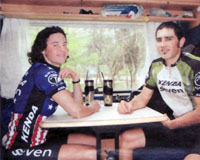
“This lifestyle is a choice for them, they don’t want what comes with a more rigid sponsorship deal,” Miller said. “Sure, they don’t have those advantages, But I think it gives their program a sense of authenticity and pureness.” It also affords them complete freedom in choosing their battles. In the last four years the two have tackled off-the-beaten track races in Puerto Rico, South America, Cyprus and the Czech Republic. It’s a safe bet that a traditional American team would have put the kibosh on such international travels, preferring the duo stayed stateside to race National Mountain Bike Series instead. Broderick and McConneloug transitioned from a domestic to European-focused program in 2004. McConneloug’s breakthrough 2003 season—she took her first NORBA victory at Mount Snow and finished third in the series—had her positioned as a contender for the sole U.S. women’s spot for the Athens Olympics. To earn the Olympic berth, McConneloug and Broderick needed to travel to Europe and chase UCI points on the World Cup circuit. That meant the part-time jobs had to go. “It was unreal, it was like all of a sudden making the Olympics was right there,” McConneloug remembers. “That was the end of the sweat shop.”
The buzz and excitement surrounding McConneloug’s possible Olympic berth stretched back to her sponsors. Kenda, which had come on in 2001 as a gear sponsor and slowly transitioned into a cash donator, came through with an eyebrow-raising offer. “I told Mary I was willing to offer her a pot of gold to make the Games,” said Jim Wannamaker, Kenda’s head of cycling marketing. Wannamaker took out a policy with an insurance company against the odds of McConneloug making the games. While he asked for the amount to remain confidential, it was a lump sum big enough for the duo to purchase their first house, and a big one at that.
“Nobody in cycling had been offered a bonus for making the Olympics like that, and she was totally flabbergasted,” Wannamaker said.
To Wannamaker’s surprise, McConneloug declined. She and Broderick instead asked for a substantially smaller sum and multi-year deal to cover travel expenses and the fee to rent a motor home in Europe.
“Money has a funny effect on people, and in the case of Mary she told me she was already motivated,” Wannamaker said. “I think the cash incentive might have been a negative motivator.”
McConneloug proved she owned the motivation. She and Broderick drove across Europe to chase down UCI points, and she regularly finished inside the top-15, fighting tooth-and-nail with her compatriots Susan Heywood and Alison Dunlap for the spot. The subsequent battle for the 2004 Olympics formed the backbone to Jason Berry’s 2005 film, Off Road to Athens. Much has been written of USA Cycling’s eventual bungling of the decision. While the UCI Web site listed McConneloug as the final points winner in the chase, USA Cycling decided to include a handful of points from a 2003 short track towards Heywood’s numbers, giving the Trek-Volkswagen rider the slight advantage. But they agreed to count the points without notifying McConneloug.
Following the advice of her friends and family McConneloug wanted an outside opinion, and took the case to arbitration. “I just wanted a third party’s opinion. I had invested so much time and effort into the chase it seemed like the right thing to do,” McConneloug said. In a controversial move, the arbitration subsequently took the spot away from Haywood and handed it to McConneloug.
Barry caught the dramatics on camera, shooting a teary-eyed Haywood facing the reality that the Olympic spot was no longer hers. He also filmed a sizeable interview with McConneloug.
“After filming Mary my hope was that people wouldn’t pass judgment on her decision [for arbitration], because she knew it had likely cost her a friendship [with Haywood],” Barry said. “Even after the tape stopped rolling Mary couldn’t stop sobbing.”
To China and Beyond
Mike Broderick and Mary McConneloug are a couple who don’t need a marriage license to legitimize their dedication to one another. It’s been nearly a decade since they formed their team, and neither show signs of slowing down any time soon.
“Those two are around each other 24-7, and they’ve done it for how long and still make it work?” Barry said. “They put themselves into a total pressure cooker, and they live in that little space. They are the couple in mountain biking right now, they must communicate really well, I guess.”
In between bites of stir-fry, McConneloug says she and Broderick will probably host some kind of blowout party to celebrate their bond—someday, anyway. At the moment they have a more pressing objective. Last year McConneloug surrendered her top-dog status to Americans Georgia Gould and Willow Koerber, who both finished ahead of her in the World Cup standings. So far this year McConneloug has fought her way into contention for the second American spot in Beijing, but she can’t let up just now. She still has three races that could make or break her Olympic dream.
Broderick knows he’s a long shot to make the Games. While his abilities on technical, muddy trails are legendary, he lacks the high-end speed and raw power of his American counterparts. He was a disappointing DNF at the World Cup opener at Houffalize, but he still has hope.
And after the Games? The two say they are still committed to living abroad—the huge crowds and prize cash at European races legitimize their efforts, and they’re not quite ready to leave that behind.
And that means Mary McConneloug and Mike Broderick will have a plethora of future stories to tell. With the sun setting on their German chalet, McConneloug’s eyes spring to life as she remembers another hum-dinger.
“In Munich we pulled over to the side of the road by an old church to sleep, it was pouring rain and I think there was a ‘no parking’ sign there,” McConneloug says, painting a vivid picture. “We stuck out like a big, white sore thumb in the green fields, but we didn’t care, we’d just take the parking ticket. When we wore up in the morning, everything was white with snow, and the RV was hidden. It was amazing.”
